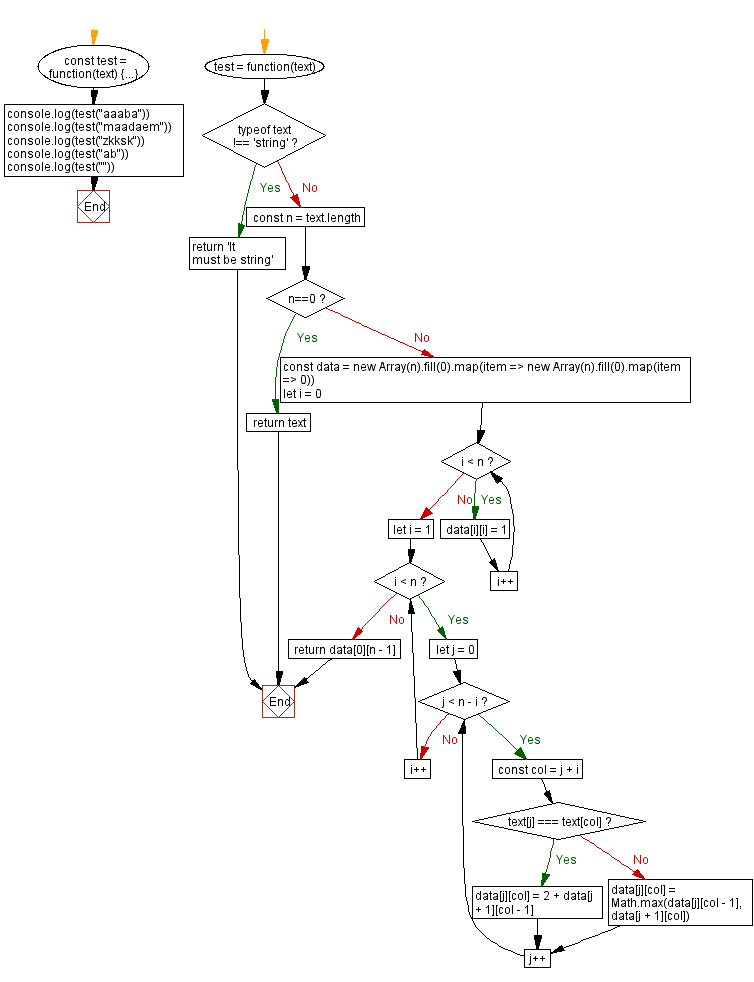JavaScript: Longest Palindromic Subsequence
JavaScript String: Exercise-63 with Solution
Longest Palindromic Subsequence
Write a JavaScript function to find the length of the longest palindromic subsequence in a given string.
Subsequences are sequences that can be created by deleting some or all of the elements from another sequence without changing their order.
Test Data:
("aaaba") -> 4
("maadaem") -> 5
("zkksk") -> 3
("ab") -> 1
("") -> ""
Sample Solution:
JavaScript Code:
// Define a function called 'test' with a parameter 'text'
const test = function(text) {
// Check if the input 'text' is not a string, return a message
if (typeof text !== 'string') {
return 'It must be string'
}
// Get the length of the input string 'text'
const n = text.length
// If the length of the string is 0, return the input string
if (n==0) {
return text
}
// Initialize a 2D array 'data' with dimensions 'n x n' filled with zeros
const data = new Array(n).fill(0).map(item => new Array(n).fill(0).map(item => 0))
// Set diagonal elements of 'data' to 1
for (let i = 0; i < n; i++) {
data[i][i] = 1
}
// Iterate through each character of the input string 'text'
for (let i = 1; i < n; i++) {
for (let j = 0; j < n - i; j++) {
// Calculate the column index
const col = j + i
// If the characters at indices 'j' and 'col' are equal
if (text[j] === text[col]) {
// Update 'data' with the length of the palindrome by adding 2 to the value of the previous diagonal element
data[j][col] = 2 + data[j + 1][col - 1]
} else {
// Otherwise, update 'data' with the maximum value from the adjacent elements
data[j][col] = Math.max(data[j][col - 1], data[j + 1][col])
}
}
}
// Return the length of the longest palindromic subsequence, which is stored at data[0][n - 1]
return data[0][n - 1]
}
// Test the 'test' function with different input strings and output the result
console.log(test("aaaba")) // Output: 4
console.log(test("maadaem")) // Output: 5
console.log(test("zkksk")) // Output: 3
console.log(test("ab")) // Output: 1
console.log(test("")) // Output: ""
Output:
4 5 3 1
Explanation:
In the exercise above,
- The function checks if the input 'text' is not a string, in which case it returns a message.
- It gets the length of the input string 'text'.
- If the length of the string is 0, it returns the input string itself.
- It initializes a 2D array 'data' with dimensions 'n x n' filled with zeros, where 'n' is the length of the input string.
- It sets the diagonal elements of 'data' to 1, representing single characters as palindromes.
- It iterates through each character of the input string and calculates the length of the longest palindromic subsequence using dynamic programming.
- It returns the length of the longest palindromic subsequence, which is stored at 'data[0][n - 1]'.
Flowchart:

Live Demo:
See the Pen javascript-string-exercise-63 by w3resource (@w3resource) on CodePen.
For more Practice: Solve these Related Problems:
- Write a JavaScript function that finds the length of the longest palindromic subsequence in a string using recursion with memoization.
- Write a JavaScript function that implements a dynamic programming solution to determine the longest palindromic subsequence.
- Write a JavaScript function that returns both the length and the subsequence itself from the given string.
- Write a JavaScript function that handles empty strings and returns a default value when no palindrome exists.
Go to:
PREV : Longest Valid Parentheses.
NEXT : JavaScript Bit Manipulation Exercises Home.
Improve this sample solution and post your code through Disqus.
What is the difficulty level of this exercise?
Test your Programming skills with w3resource's quiz.
